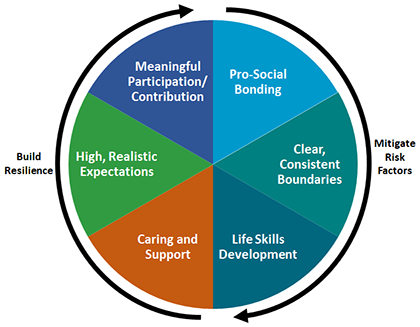Social and Emotional Learning (SEL)
FCPS partners with families to help students develop mental wellness and social and emotional skills.

If you need additional wellness support for your child this school year, please directly contact support staff at your child’s school including the school counselor, school psychologist, or school social worker. The information for these staff members can be located on the school's website.

It is not easy growing up in today’s world. Children and adolescents are faced with adversity and life challenges each and every day that can undermine mental health and interfere with learning. These challenges include:
Adults play a critical role in promoting positive outcomes for youth. Whether as parents or guardians, school staff, or community members, we have an opportunity to foster assets in youth to help them manage stress, make better choices, and develop healthy habits. Assets (also referred to as protective factors) counter the challenges of daily life. They work to buffer and propel youth through negative life experiences and enhance the likelihood of making good decisions. Assets will not only protect youth now, but into the future. The more assets young people have, the more likely they will thrive.
FCPS partners with families to help students develop mental wellness and social and emotional skills.
The Fairfax County Youth Survey is given to all students in grades 6, 8, 10, and 12 each fall. It provides a wealth of information about a variety of topics related to our youth that influence their physical and mental well being, from sleep and nutritional habits to substance abuse behaviors to symptoms of depression and suicidal thoughts.
As in national and other research studies, the Fairfax County Youth Survey has consistently shown that when youth have more assets or protective factors in their lives, they are less likely to engage in problem behaviors or experience other negative outcomes in areas including (but not at all limited to) mental health and suicide, substance use, bullying, and gang involvement. The patterns hold true across genders, racial and ethnic differences, sexual orientation, and other demographics.
School officials, youth leadership classes, youth serving county agencies, and local nonprofits use the survey data to determine the effectiveness of school and community intervention and prevention programs and to identify changing trends and areas of need.
View information on the results of the latest Fairfax County Youth Survey.

Analysis of the Youth Survey has led to the development of the Three to Succeed concept. This is the notion that the presence of just three assets in a youth’s life dramatically reduces risk behaviors and mental health health symptoms, and promotes thriving youth...and the more assets, the better potential for positive outcomes. Building assets within youth is more effective and efficient than implementing programming to prevent poor outcomes. If we can ensure a young person has an asset at home, at school, and in the community, that young person will already have three and be well positioned for success.
Learn more about Three to Succeed.
Everyone plays a role in ensuring that children are thriving in Fairfax County. The Fairfax County Youth Survey has investigated 15 assets within the school, community, and family domains to determine how prevalent these external supports are in the students’ environments. Six additional items measured individual behaviors and attitudes that help young people develop into successful adults. Remember..it only takes three assets to make a significant difference in the lives of youth!
Substance Abuse Prevention Specialists are Available to Support Your Child

Resiliency is the capacity to overcome adversity by responding in healthy and productive ways to successfully meet life’s challenges. In other words, it’s the ability to bounce back. All youth have the capacity for resilience. It is a combination of personal strengths and the assets available to you within your family and community. It can grow and change over time. Each time youth exercise their coping skills in responding to challenges, they strengthen them and increase their resilience and capacity to manage future adversity.
Building resiliency in our youth is critical to their ultimate success and enjoyment in life. One model for fostering resiliency in youth is the Resiliency Wheel. The wheel identifies six resiliency builders that can be provided by schools, families, and communities that mitigate risk factors and build resiliency. The assets identified in the Fairfax County Youth Survey fall within the larger domains of resiliency builders identified as part of the Resiliency Wheel. Research has shown these six resiliency builders to be effective in helping our youth successfully meet the stress and challenges they face in their lives. They enhance a young person's ability to resist risks and make good decisions. The more resiliency builders set in place in a youth’s life, the higher likelihood that youth will respond to challenges with resilience.
Give youth unconditional positive regard, kindness, love and encouragement. Celebrate their successes and foster a sense of community belonging. Above all else, all youth need a significant relationship with at least one caring, positive adult.
Here are some ideas on how to provide caring and support:
Communicate to youth the belief that they can be successful. Support and encourage goal-setting for educational and vocational endeavors that reflect positive thinking and belief in oneself.
Here are some ideas on how to set and communicate high, realistic expectations:
Explore Options to Prepare Your Child for Life After High School
Provide youth with the responsibility and chance to demonstrate their competence and eagerness to contribute and give back to others. Allow them leadership roles and opportunities to collaborate in decision-making.
Here are some ideas on how to provide opportunities for meaningful participation:
Service Learning Provides Opportunities for Meaningful Participation
Ensure that youth have positive connections with their peers and adults. Help connect them to extracurricular activities and to caring, trusted, and supportive adults.
Here are some ideas on how to increase pro-social bonding:
Participation in Activities Provides Opportunities for Prosocial Engagement
Fairfax County Offers Opportunities for After School Activities
Provide youth with clear guidelines on the expectations of behavior and apply appropriate and consistent consequences.
Here are some ideas on how to set clear, consistent boundaries:
The FCPS Parent Resource Center Provides Parenting Tips and Supports
Provide youth with the independent skills needed to navigate through the challenges of life; these include social, problem-solving, and coping skills. Model and encourage healthy life choices.
Here are some ideas on how to teach life skills:

Trauma-informed spaces use design elements to prioritize the safety and inclusion of all individuals while minimizing potential stressors. Some spaces also include materials and activities to help students regulate challenging emotions. Schools can makeover all sorts of places, like classrooms, hallways, cafeterias, and even meeting rooms, to buffer stress and foster resilience. Here are some ways they might do it:
All schools have access to the Guidance for Creating Trauma-Informed Spaces planning tool and support from the Social and Emotional Learning Team (SEL) and Special Education teams to support planning for high quality spaces. The planning tool walks school teams through a variety of trauma-informed considerations for creating or adapting spaces. Schools consider important supporting details such as:
Schools must adhere to School Board policies that identify what equipment and furniture can be added safely in a school space. Trampolines and swings are examples of equipment that are not recommended within the instructional environment.
Trauma-informed spaces are shared spaces, accessible to all as compared to planning for individual interventions for students. Spaces like a classroom space may contain self-regulation tools that may benefit your student. Trauma-informed spaces are tailored to meet the greater needs of the school community.
If your student has an IEP or 504 plan, work with your case manager to consider what might be incorporated into the existing plan. Self-regulation and sensory needs can be supported by a teacher or other instructional staff member directly or through environmental supports, adaptations, and/or accommodations. If your student has not been identified as a student with a disability, speak with your student’s teacher or counselor about what options are currently available within your school.
Some considerations might be:


The Family Resource Center organized resources for military-connected families.

Resources for school personnel, families, and communities to take an active role in suicide prevention.